#lubna of cordoba
Text

lubna of cordoba and robert of chester by alex mcadoo, 2022, oil on linen, 72 × 60 inches
16 notes
·
View notes
Photo
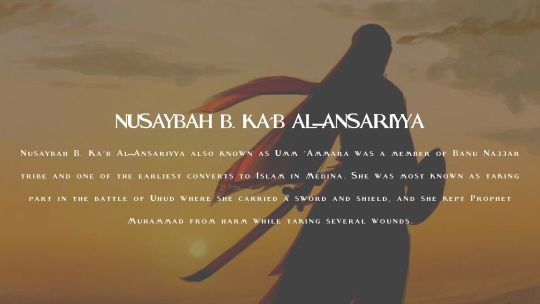
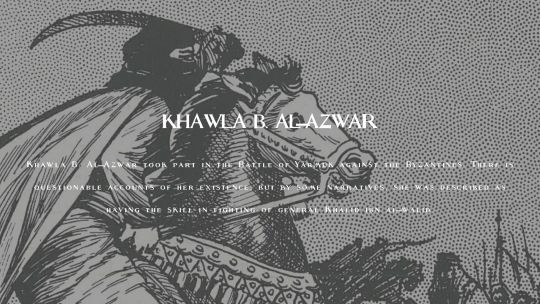
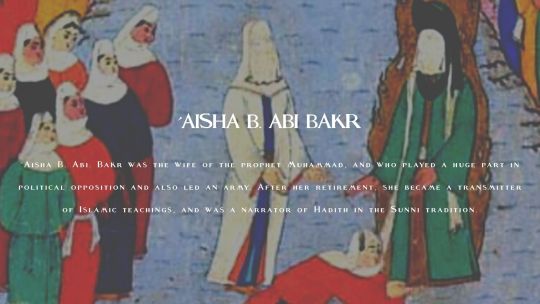
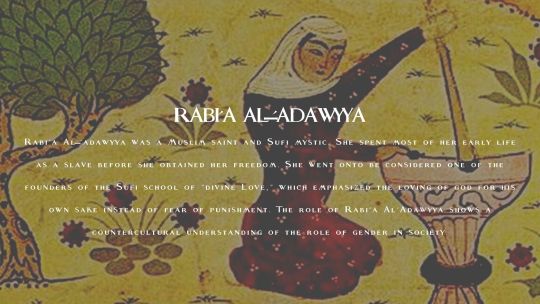
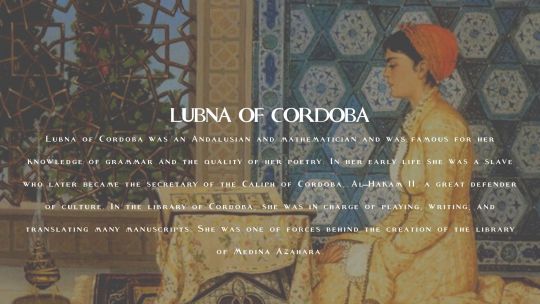
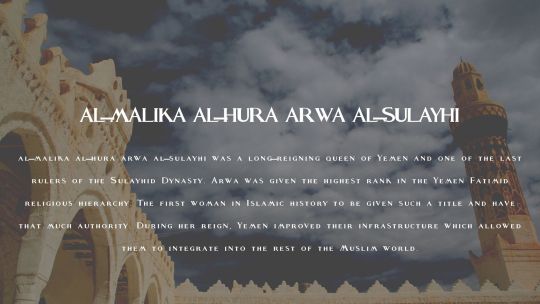
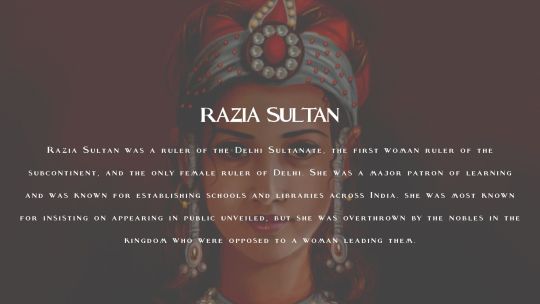
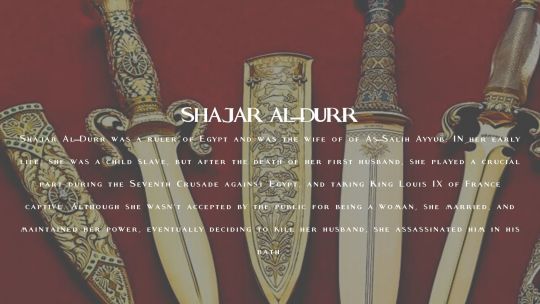
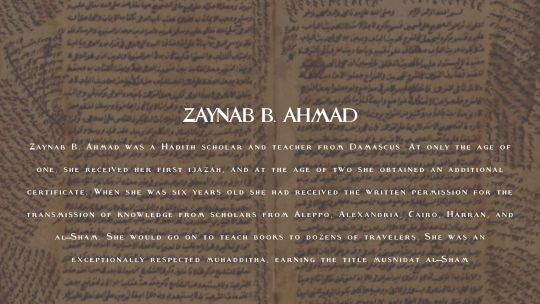
history | women throughout history | muslim women
#but here it is\another addition to the series#history#powerful women#muslim women#nusaybah b. ka'b al-ansariyya#khawla b. al-azwar#'aisha b. abi bakr#rabi'a al-adawyya#lubna of cordoba#al-malika al-hurra arwa al-sulayhi#razia sultan#shajar al-durr#zaynab b. ahmad#myedit#mine#aesthetic#graphics#if there's mistakes let me know#women throughout history#theres 100% a typo but im way too tired to fix it
220 notes
·
View notes
Photo










request:
↳ 10 Favorite Non-Royal Women from History (Amarah’s choice)
#edits#gifs#weloveperioddrama#perioddramaedit#lubna of cordoba#lin sinaig#madame de pompadour#georgiana cavendish#georgiana duchess of deveonshire#fitnat hanim#mary wollstonecraft#mary shelley#josephine baker#frida kahlo#asmahan#english history#middle eastern history#ottoman history#10th century#17th century#18th century#19th century#20th century#mexican history#syrian history#french history#american history#chinese history#spanish history#european history
437 notes
·
View notes
Photo









LITERATURE MEME || Poets (1/5)
↬ Lubna of Córdoba (fl. 10th century)
"These copyists included, most interestingly and unusually, a poetess named Lubna." -- Richard A. Fletcher, Moorish Spain
#lubna of cordoba#literature meme#spanish history#european history#women's history#books#history#nanshe's graphics#medieval
64 notes
·
View notes
Photo




|Endless list of favorite non-royal women | Women of Languages
Lubna of Cordoba | Born a slave on the rich and peaceful Caliphate of Cordoba. Extraordinary intelligent she was praised for her knowledge in calligraphy, grammar and mathematics. Freed, she became the caliph Al-Hakam II personal scribe. She had a role on managing and working in the monarch library.
Beatriz Galindo | Born in the South of Spain, in Salamanque home of a great university, Beatriz family was noble but poor, due to her great learning abilities she was send to a nunnery, she was also soon noticed by university professor for her talent for reading, speaking and translating Latin she was know as “La Latina". Later, Queen Isabella, the Catholic Monarch herself called Beatriz to court and she taught the Queen and her daughters Latin. For her important works of charity a neighborhood of Madrid is still called “La Latina”.
Malinalli / Doña Marina | A still incredible controversial figure, Mallinali was born on a noble family in Southern Mexico but was sold to slavery. Given to conquistador Hernán Cortés, she soon proved useful to the European troop for her knowledge of different languages, she soon learned Spanish and became essential in the conquest of Mexico. Advising Cortés on local custom and helping them negotiate, she later had an affair with him. After converting to Christianism she was know as Doña Marina.
Helene Maria Williams | Born in 1759 in London, Helene has a good education and soon gained some renown as a poet. In her twenties she moved to France and soon become very enthusiastic about Revolutionary ideas. After perfecting her French, she became a translator but also an interpreter of French political situation and customs to English. A salonière, she hosted reunions that led her to jail on one occasion. She was disenchanted of Napoleon but despite multiples travels always went back to her adopted land.
36 notes
·
View notes
Photo

Lubna of Cordoba, . 10th-century Muslim mathematician was well-versed in the exact sciences. Her vast acquaintance with general literature obtained her the important employment of private secretary to the Umayyad Caliph of Islamic Spain (Al-Andalus), Al-Hakam II (who took the title al-Mustansir). . Painting by Osman Hamdi Bey. https://www.instagram.com/p/Bxd42BxFrx0/?utm_source=ig_tumblr_share&igshid=g8ljvf46i436
32 notes
·
View notes
Photo
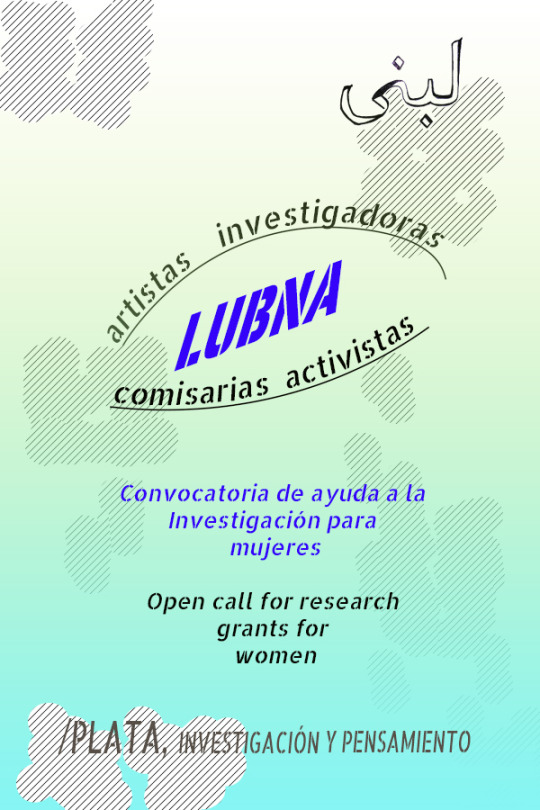
“LUBNA” Convocatoria de ayuda a la Investigación para mujeres.
(English bellow)
Introducción
Las residencias de investigación se plantean desde la perspectiva del apoyo mutuo. /PLATA es un lugar en construcción donde damos mucho valor a los propios ecosistemas del arte, intentando adaptarlos a las realidades familiares y profesionales de las distintas personalidades que trabajamos en ellos. Un programa de residencias debe entonces ser mucho más flexible, encontrando los tiempos y los espacios adecuados, mimando tanto a las personas como a los procesos en los que comúnmente nos adentraremos.
La convocatoria LUBNA de investigación para personas que se identifican como mujeres, busca a artistas, comisarias, activistas y en general cualquier investigadora que dedique su vida a prácticas que profundizan en el contexto presente desde una mirada crítica y creativa.
Objeto
Nuestro propósito es abrir Córdoba y su contexto cercano a nuevas perspectivas de estudio. Para ello seleccionaremos a una investigadora motivada a trabajar con nuestro equipo. Partimos de reescribir la historia local, la sociología, los estudios de género y la justicia social, el estado de la agricultura, el urbanismo, el colapso de la industria turística, la situación cultural y de las artes o la degradación económica, por citar algunos campos de investigación. Más allá de una visión académica, nos interesan nuevas miradas y la transmisión de mensajes que cuestionen las narrativas oficiales.
La convocatoria también pretende impulsar directamente la visibilidad de la mujer en las artes, especialmente aquellas que, tras construir un currículum interesante, se encuentran en una posición profesional injustamente débil en comparación con otras disciplinas.
Formalización de la residencia
El trabajo no tiene necesariamente que traducirse en una exposición.
Sí pedimos como conclusión de la investigación un retorno público, ya sea en forma de conferencia, de taller, de publicación o en cualquier otro formato idóneo para establecer ciertas conclusiones sobre la investigación.
Tiempos
Nuestro primer criterio de selección es la profundidad y coherencia de la propuesta. Para un buen desarrollo de la misma, somos conscientes de la flexibilidad temporal necesaria. Dicho esto, ofrecemos un calendario orientativo que puede servir a la hora de redactar la solicitud.
El inicio de la beca es en el mes de abril, la formalización en otoño. En este período la ganadora deberá pasar al menos un mes en Córdoba, no necesariamente tiene que ser continuo. Nota: en los meses de verano el personal de /Plata puede no estar en la ciudad.
Qué recursos te ofrecemos
1. Espacio de trabajo propio en /PLATA con conexión a wifi e impresora.
2. Durante la fase de producción (trabajo que puede iniciarse antes de tu llegada) te ofrecemos toda nuestra pasión, interés y acompañamiento. Introducción al contexto de la ciudad, presentación de recursos y personas relevantes para la investigación, paseos, visitas, salidas, comidas. También podemos ayudarte a participar en eventos de otras instituciones/asociaciones, así como en la gestión de acceso a archivos, etc. El equipo estará por ti, para darte cariño en el proceso, siempre atentos a la diversidad y sensibilidad de las personas.
3. Ayuda técnica en la formalización de tu proyecto.
4. Difusión del proyecto en la web y nuestras plataformas.
4. Gestión de tu alojamiento.
Dotación
-1500 eu honorarios
-Alojamiento en habitación individual. (30 días máximo)
-Madres de hijos menores y/o mujeres con personas dependientes a su cargo: 200 eu por hijo hasta un máximo de 500eu.
-Atención: la residencia no incluye ningún seguro médico. Es obligatorio que cada residente trámite personalmente un seguro médico en su país de origen válido por el periodo de su residencia en Córdoba.
Proceso de solicitud
La solicitud se enviará en un único archivo con formato pdf (máx.10Mb) al correo [email protected] con el asunto “Convocatoria Lubna de Investigación” con la siguiente documentación:
-Datos personales (Nombre completo, fecha y lugar de nacimiento, número de DNI o pasaporte, contacto email, contacto telefónico).
-Carta de Motivación: no es una biografía y sí es un breve discurso sobre tus intereses por venir a Córdoba y trabajar con nosotras. Máx. 2000 caracteres.
-Currículum Vitae
-Proyecto teórico + idea de formalización. Máx 3000 caracteres.
-Dossier Gráfico (Optativo).
-URL para vídeos (Optativo).
-URL web personal (Optativo).
-En caso de ser madre, debes presentar fotocopia de libro de familia.
-Si tienes personas dependientes a tu cargo debes presentar certificado que lo acredite.
Criterios de selección
La selección la realizará el jurado de /PLATA bajo los siguientes criterios:
Primero, recuerda que somos una entidad independiente y que nuestro carácter pasional nos hace muy sensibles a relacionarnos con personas que plantean proyectos innovadores tanto en las formas como en el contenido.
Segundo, indagaremos en el interés y la viabilidad de la propuesta.
Por último, valoraremos tus trabajos anteriores.
Plazo de solicitud
El plazo para enviar la solicitud es del 8 al 31 de marzo.
Se comunicará el resultado de la selección final en la primera semana de abril.
Más información
"LUBNA" Open Call for research grants for women.
Introduction
Research residencies at /Plata are approached with ideas and perspectives that include mutual support. /Plata is a growing organism, under construction, where great value is placed within the ecosystems of art, aiming to adapt these systems to both family and professional realities conducive to the different personalities of those who work within them. We believe that it is necessary for a residency program to be flexible, finding correct timing and space, taking care of both the people and the processes in which we will commonly go deeper.
The LUBNA open call for research grants for those who identify as women seeks artists, curators, activists and in general any researcher who dedicates her life to practices that delve into the present context from a critical and creative point of view.
Objective
Our purpose is to expose Cordoba -and its surrounding context- to new perspectives of study. In order to do so a selected jury will choose a motivated researcher to work with our team. Beginning with rewriting local history, sociology, gender studies and social justice, the state of agriculture, urbanism, the collapse of the tourist industry, the cultural situation and the arts or economic degradation- to name just a few fields of research. Beyond an academic vision, we are interested in new perspectives and the transmission of messages which question the official narratives.
The call also aims to directly promote the visibility of women in the arts, especially those who, after building an interesting curriculum, find themselves in an unfairly weak professional position compared to other disciplines and professional workers.
Formalization of the residency
The work created during the residency does not necessarily have to be translated into an exhibition. /Plata does request a gesture for the artist at the conclusion of the residency in either the form of a conference, workshop, publication or any other format suitable to establish certain conclusions which concentrate on the research conducted.
Timing
Our first criteria for selection is the depth and coherence of your proposal. In order for there to be progressive development within certain proposals, we are aware of the necessity for time flexibility. That said, we offer an indicative calendar that may be useful when writing your application.
The scholarship will begin in the month of April 2021 and will formalize in autumn. During this period the grant recipient must spend at least one month in Cordoba (not necessarily continuous). Note: in the summer months the staff of /Plata may not be in Córdoba.
Resources at your disposal
1. Workspace in /Plata with wifi connection and printer.
2. During the production phase (work that can start before your arrival) we offer you all of our support, passion and interest. Upon arrival we will introduce you to the context of Córdoba, facilitating possible resources (including people relevant to the research) tours, visits, outings and meals. We can also help you access and participate in events organized by other institutions/associations, as well as access to archives, etc. Our team will be here for you providing warmth throughout the entire process, always attentive to the diversity and sensitivity of everyone involved.
3. Technical assistance in the formalization of your project.
4. Dissemination of the project through our web and social media platforms.
4. Management of your accommodation.
Endowment
-1500 euro
-Accommodation in a single room. (30 days maximum)
-Mothers of underage children and/or women with dependents: 200 euro per child and/or dependent (up to a maximum of 500 euro).
*Attention: the residency does not include medical insurance. It is compulsory for each resident to personally arrange medical insurance in the country of origin valid for the period of residence in Cordoba.
Application process
The application should be sent in a single pdf file (max.10Mb) to [email protected] with the subject "Lubna Open Call for research grant for women¨ including the following documentation:
Personal data (Full name, date and place of birth, ID or passport number, email contact, telephone contact).
Motivation Letter (not a biography but a brief speech concerning your interests in coming to Córdoba and working with us) Max. 2000 characters.
Curriculum Vitae
Theoretical project + idea of formalization. Max 3000 characters.
Graphic Dossier (Optional).
URL for videos (Optional).
Personal web URL (Optional).
If you are a mother, you must submit a photocopy of birth certificates.
If you have dependents, you must present a certificate which can prove so.
Selection process and criteria
The selection will be made by a jury of professionals selected by /Plata under the following criteria:
First it is important to remember that we are an independent entity and our passionate nature makes us very sensitive to relate to people who propose innovative projects both in form and content.
Second, we will investigate the interest and feasibility of the proposal.
Finally, we will evaluate your previous work.
Application deadline
The deadline for submitting the application is March 8-31.
Final selection results will be communicated in the first week of April.
For more information, please contact:
0 notes
Video
youtube
Lubna de Córdoba - Le savoir par les livres - Micro-bio 14
“Elle est une écrivaine intelligente, une grammairienne, une poétesse, compétente en arithmétique, complète dans ses études. Personne au palais n’était aussi noble qu’elle.”
C’est ainsi qu’Ibn-Bashkuwal décrit du 12e siècle Lubna de Córdoba dans son dictionnaire biographique. C’est une des mentions de Lubna de Córdoba dans des textes historiques mais on en sait rarement beaucoup plus.
Si sa condition d’esclave peut surprendre, il faut savoir qu’à l’époque que les femmes esclaves étaient évaluées sur leurs connaissances en arabe, en calligraphie, en musique.
Bibliographie :
Kamila Shamsie (2016) Librarians, rebels, property owners, slaves: Women in al-Andalus, Journal of Postcolonial Writing, 52:2, 178-188, DOI: 10.1080/17449855.2016.1164968
Le podcast "The Islamic Golden Age, Lubna of Cordoba". www.bbc.co.uk. BBC Radio 3. https://www.bbc.co.uk/sounds/play/b03vd5xt
Sa fiche wikipedia en anglais
Musique par Doug Maxwell
Photos :
Lubna par José Luis Muñoz (2012) - CC By SA - https://commons.wikimedia.org/wiki/File:Lubna_JLMunoz.jpg
Le conseil poétique à la cour d'Al Hakam II, calife de Cordoue - Domaine Public - https://commons.wikimedia.org/wiki/File:Majlisse_el_Chi%27ir_%C3%A0_la_coue_d%27Al-Hakam_II.png
Medina Azahara (Cordoue) par Roberto Venturini (2008) - CC By - https://commons.wikimedia.org/wiki/File:Cordoba,_Medina_Azahara.jpg
0 notes
Photo

Lubna of Cordoba, 10th-century Muslim mathematician was well-versed in the exact sciences. Her vast acquaintance with general literature obtained her the important employment of private secretary to the Umayyad Caliph of Islamic Spain, Al-Hakam II (painting by Osman Hamdi Bey). https://www.instagram.com/p/ByK_j3XHUR9/?igshid=1lhjdn9unvts1
0 notes
Note
DO ALL THE MUSLIM WOMEN IN HISTORY IF U CAN OMG THEY'RE GREAT if not can u at least do kamala khan and asiya :")
omg imma listen to you and do all of them 😂A’isha bint Abu Bakr: Share one piece of knowledge that has significantly impacted your life.umm anything that the Quran teaches me tbh Maryam: Describe one time you’ve stood by your convictions despite opposition.the fact that Muslims shouldn't be hostile toward people that don't share similar beliefs?? like dude. just because someone isn't muslim does not mean you are obligated to be rude or hostile toward them. i see this mainly amongst the older generations, like 30 yo and up, and i'm just like, that's NOT what "enjoin good and forbid evil" means. Assiyah: What is something you’ve clashed over with a parent/authority figure and why?going away for school. my parents are 100% against that even if going away means better opportunities for me Fatimah bint Muhammad: Describe one time you defended a family member (from slander or otherwise). my cousin was being awful to my mom (she has depression, my whole extended family thinks she's just lazy), and so i called him out and accidentally cussed him out in front of my parents OOPS. but i shut him up :')Nusaybah bint Ka’ab: Do you think violence can solve problems? Why or why not?i agree with Malcolm X. if someone is being violent toward me, i'm not gonna sit around and be like oh ahah i'm not gonna do that to you. i'm not talking about unnecessary aggression, but if someone is attacking me i WILL attack back Fatima al-Fihri: If money/other factors weren’t an issue, what would you choose to study and why?i would study literature, primarily middle eastern/non-western literature. although i might do a minor in thatShajjar al-Durr: What leadership role have you played (or want to play)?i just applied for MSA president at my school as you all know so iA khair :')Khadijah: Pitch a business idea. Who will it benefit?a food truck that gives out free fresh organic produce to people living in poverty-stricken areas and food deserts!? it will benefit those ppl because those people are the ones who need help Rābi‘a al-‘Adawīyya: Do you consider yourself a spiritual or religious person? Why or why not?i don't like the term religious. it is so broad and controversial. Islam is made to be easy and flexible, not everyone is going to follow it the exact same way. that being said, i am very spiritual, although i always need to work on things like salah and thikr Lubna of Cordoba: What is your favorite subject in school and why? CHEMISTRY IS SO FUN??????? also anything involving english or lit Razia Sultan: Describe a time you broke tradition and why.i got my nose pierced and that's unheard of in arab culture LMAO Zaynab bint Ahmad: What is something you would consider yourself very knowledgeable in?writing and grammar Sayyida al-Hurra: Describe a situation in which you might turn to crime.i can't think of any??!Kamala Khan*: What is a cause that you do/would fight for and why?women's rights because i'm a woman and everyone should fight for women's rights??????
5 notes
·
View notes
Text
The Acolytes of Lubna
So, recently a flare-up of gate-keeping idiocy happened in the Warhammer 40K world, centered around the lack of women as Space Marines. I’m not going to reprint what was said, save that it’s the usual “Women can’t be Space Marines.”
To which I say, “Oh Yeah?
So I came up with the idea of the Acolytes of Lubna after doing a brief Googling of women in history. I came across the tale of Lubna of Cordoba, daughter of Caliph Al-Hakam II, and a master poet, scribe, mathematician, and librarian in 10th Century Spain.*
So I said to myself, “Self, this idea’s getting some legs to it. What if this Chapter had a grand library and these were its protectors?”
Of course the question arises: How do I make this work? How do I put together Space Marines that are women? I’m not changing the armor for boob covereage -- I prefer the armor be real (ala Captain Phasma). Then I came across Statuesque Miniature’s Heroic Scale Accessories. Yes, people could joke about not wearing helmets, but hey, it worked for Judge Anderson, and they can’t exactly flash their dying foes like Anne Bonny, so women’s head bits it is!
With that, I started drawing up the Army List.
HQ
Terminator Captain Ines de la Cruz (Inspired by Sor Juana Ines de la Cruz), and her Command Squad (five veteran Marines)
Librarian Alexandra (See what I did there?), and her Command Squad (five Veteran Marines)
Troops
Three Tactial Squads of Marines (full squads of 10 Marines each) with a Rhino Transport each.
One Squad of five Scouts piled into a Land Speeder (I’ll need a copy of the squad on foot in case someone trashes their ride.
One Squad of five Scouts with sniper rifles, led by Veteran Sergeant Pavlychenko
Elites
One Venerable Dreadnought with extra armor
One Squad of ten Terminators
Fast Attack
One Stormtalon Gunship, piloted by Sergeant Raskova.
One squad of 10 Assault Marines
Heavy support
One Land Raider Crusader
One squad of five Devastator Marines
One Stormraven Gunship, piloted by Leftenant Coleman
I know I’ll think of more names to attach to units as time goes on. Right now this project is in it’s infancy, but it IS going to happen. With the extra bits, I’ve estimated the cost of the army to be about $900 dollars for a 3000 points worth of Space Marine blammage.
And you KNOW I’ll have to take them to a game...
*If you can see where I’m going with this, kudos to you, as my feminism is quite inclusive.
6 notes
·
View notes
Text
A Prominent Muslim Woman: Lubna of Cordoba
New Post has been published on http://www.truth-seeker.info/jewels-of-islam/prominent-muslim-woman-lubna-cordoba/
A Prominent Muslim Woman: Lubna of Cordoba
By Dr. Ali Al-Halawani
She excelled in writing, grammar, and poetry. Her knowledge of mathematics was also immense and she was proficient in other sciences as well.
The history of Muslims witnessed a plethora of outstanding figures that cannot be overlooked or ignored. Historians could not bypass the significance of one of those outstanding figures, namely Lubna of Crodoba who died in 984 AC.
She was a slave-girl of Spanish origin who later became one of the most influential figures in the Umayyad palace in Cordoba, Spain (known in the past as, Andalus or Andalusia).
She was promoted until she became the palace secretary of Caliph Abdul Rahman III (d. 961 AC) and his son Al-Hakam ibn Abdul Rahman who died in 976 AC. A list of roles that have been ascribed to her include: poet, copyist, scribe, royal library’s acquisitions expert, private secretary, and mathematician.
Her knowledge and skill as far as mathematics is concerned were of paramount standing. She was attested to as a great mathematician with marvelous mathematical skills. She headed the royal library which contained more than 500.000 books at that time and was one of the world’s biggest libraries in that time. Some sources state that Lubna was personally responsible for acquiring new items for the library, and that she travelled to Cairo, Damascus, and Baghdad to do so.
To quote the famous Andalusian scholar Ibn Bashkuwal, he said, “She [Lubna] excelled in writing, grammar, and poetry. Her knowledge of mathematics was also immense and she was proficient in other sciences as well. There were none in the Umayyad palace as noble as her.” She was reported to have been so fond of mathematics indeed that she would teach children the principles of mathematics and the multiplication tables while walking in the roads and streets of Andalusia. It seems that she really enjoyed this very much!
Not only that, she was also a poet, a philosopher and a calligrapher. The legacy she left contains many beautiful works and pieces of calligraphy and the Islamic art thereof. We mentioned above that she was the Caliph’s secretary and scribe. As for her role as a scribe, she was not merely a writer and a translator, she was an annotator and commentator of the books she transcribed and/or translated. She was a real scholar with diverse knowledge and vast experience. She was responsible for the copying of many important texts including works by Euclid and Archimedes, as well as providing her own annotations to the already existing texts.
According to the great historian Ibn Bashkuwal, she “mastered the writing and science of poetry, and her knowledge of mathematics was broad and great, and she has mastered many other sciences and there was no one nobler then her in the Umayyad palace. She died in the year 984 AC.
According to Arab historians, in the time of Caliph Al-Hakam II, more than 170 literate women could be found in some suburbs of the city; these women were responsible for making copies of valuable manuscripts. This gives an idea of the culture and the role of Muslim women during the reign of Muslims in Spain that lasted for several centuries until they were persecuted and driven away by the Christians of the time.
———-
Dr. Ali Al-Halawani is Assistant Professor of Linguistics and Translation, Kulliyyah of Languages and Management (KLM), International Islamic University Malaysia (IIUM), Kuala Lumpur, Malaysia. He was Assistant Professor and worked for a number of international universities in Malaysia and Egypt such as Al-Madinah International University, Shah Alam, Malaysia (Mediu) and Misr University for Science & Technology (MUST), Egypt; Former Editor-in-Chief of the Electronic Da`wah Committee (EDC), Kuwait; Former Deputy Chief Editor and Managing Editor of the Living Shari`ah Department, www.islamOnline.net; Member of the International Union of Muslim Scholars (IUMS); and member of the World Association of Arab Translators & Linguists (Wata). He is a published writer, translator and researcher. You can reach him at [email protected].
Share
#A Prominent Muslim Woman: Lubna of Cordoba#Andalus#Andalusia#Featured#library#Muslim figure#philosopher#poet#scholar#scribe#spain#translator
0 notes
Photo

Lubna (Labana) of Cordoba
Lubna of Cordoba was an Andalusian intellectual of the second half of the 10th century famous because of her knowledge of grammar and the quality of her poetry. Lubna was raised in the palace of the Sultan Abd al-Rahman III and despite humble beginnings she quickly became one of the most important figures in the Andalusian palace at the tim, she became the Khalifah's secretary and scribe as well as a secretary to his son Hakam II Ibn Abdur-Rahman. In the library of Cordoba, Lubna, was in charge of playing, writing and translating many manuscripts. She, too, along with Hasdai ibn Shaprut, was the driving force behind the creation of the famous library of Medina Azahara. As for being a scribe, she was not merely a writer and a translator, the level she reached had to “be most intimately aware of the books they transcribed and many of them were annotators of and commentators of those texts." Her love and knowledge of math was great and it is told that while walking in the roads of Andalusia she would teach children the principles of math and the multiplication tables. As if that was not enough she was also a philosopher a poet, and a calligrapher who left behind “beautiful works of calligraphy". The mathematician Labana of Córdoba was employed as Al-Hakam's private secretary. She was said to be "thoroughly versed in the exact sciences; her talents were equal to the solution of the most complex geometrical and algebraic problems"
The historian Ibn Bashkvl said "She (Lubna) mastered the writing and science of poetry, and her knowledge of mathematics was broad and great, and she has mastered many other sciences and there was no one nobler then her in the Ummayad palace”
According to Arab chronicles, in the time of Caliph Al-Hakam II, could be found in some suburbs of the city, more than 170 women literate, responsible for making copies of valuable manuscripts; a fact that gives an idea of the culture, and the role of women during the reign of the Caliph.
#lubna of cordoba#labana of cordoba#spain#granada#al andalus#andalus#andalusia#history#women#women in history#muslim women#moorish#learn
266 notes
·
View notes
Link
The problem with history is that it is mostly written by men. This is the story of Lubna of Cordoba, a poet, copyist, scribe, royal library's acquisitions expert, private secretary and mathematician who lived in Andalusia in the 10th century C.E.
4 notes
·
View notes